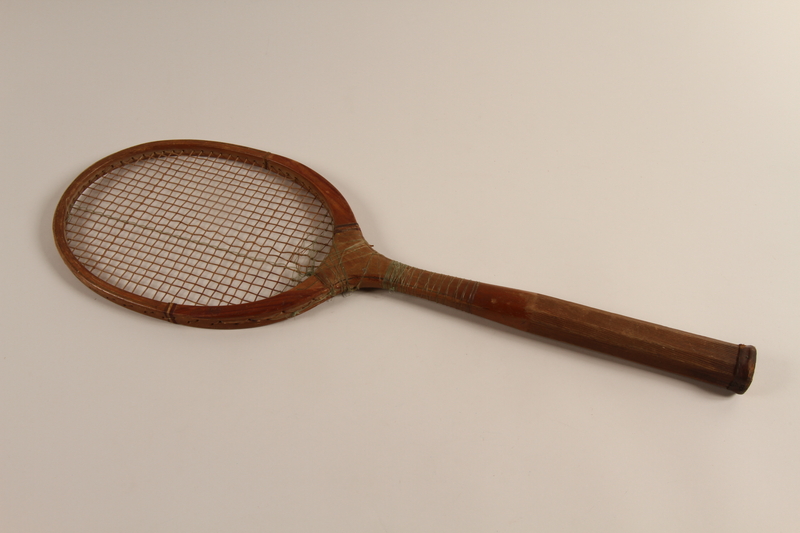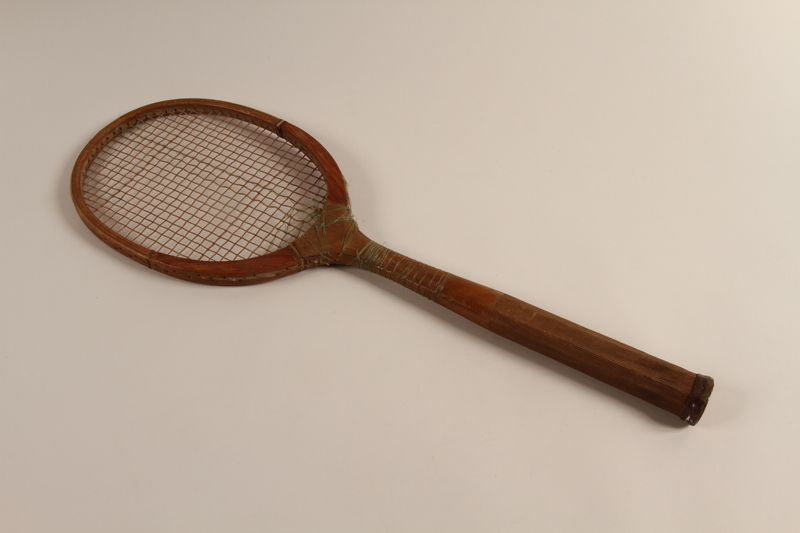Overview
- Brief Narrative
- Tennis racket made by hand and given to Aldo-Yasaiiah (Eldad) Foà as a present in 1939 from a co-worker.
- Date
-
creation:
1939
- Credit Line
- United States Holocaust Memorial Museum Collection, Gift of Ester Reisel
- Contributor
-
Subject:
Ester F. Reisel
- Biography
-
Serenella Foa’ is the daughter of Aldo-Yasaiiah (Eldad) Foa’ and Paola Foa’. She was the middle of three children. She was born in Naples on 6-19-27. Her brother Eugenio Avishua Foa’ was born in Piacenza on 9-17-25; her sister Amalia on 10-10-35 in Rome.
Her father was a chemistry engineer and served as a scientific officer in the Italian Army. He worked in an ammunition factory. Due to his job the family moved from Piacenza to Rome in 1932 and back to Piancenza in 1938. He was an Italian patriot and fought against Germany and Austria in World War I.
In 1938 her father wanted to leave Italy to work in South Africa but his passport got annulled – probably because of his military knowledge. After the racial laws she and her siblings had to quit school in Piacenza and the family moved to Milano and went they went to a Jewish school there. In 1942/43 after the air raids became more dangerous the family moved to Parma – her fathers hometown – while he kept working in Milano during the week. After he had to leave the Army he worked as an independent counselor for chemical industries.
In 1939 her maternal grandmother came to live with her family; she had gone to Great Britain and returned because the uncle she went with did migrate to the US and she could not live in a foreign country.
In September of 1943 Germany occupied the north of Italy after the Allies had signed an armistice with the successors of Mussolini. They restored him and took control over most of Italy.
Until then some Jews were arrested but their lives were not in direct danger. Now the SS took over and arrested Jews, deported and killed them. The Foa’s were on the list with Jewish citizens of their town. First they hid in their own house. Her father installed an intercom and Serenella had to answer the door when the SS came to summon her father. She told the officer that her father was in Milano and would not return until the end of the week. Her mother was sick at the time. She needed medical treatment. So when they decided to go into hiding they could not take her along. Their doctor arranged for her to stay at a local hospital along with the grandmother. Serenella had to take them there. The administrator helped them to get their story strait, knowing they were Jewish. He advised them to tell that they had come from the south; fleeing the fighting and that the family got spit up, that they lost their ID carts and that the mother got sick as soon as she arrived at the station of Parma.
Serenella, her siblings and their father went into hiding in the mountains. In a little village they stayed with a family. Again Serenella was the only one to be allowed outside. The danger for her father and brother were to big because someone could have considered them deserters and denounced them. After some time the police inquired after Serenella and she had to go to the police station to show off her ID cart. Even though she forged her last name by adding two letters the policeman recognized her as a member of the list of Jewish people he had but he let her go. So she and her family had to leave their hiding. They split up again. She and her sister went back to Parma while her father and brother went deeper into the mountains and later joined the resistance.
Physical Details
- Classification
-
Personal Equipment and Supplies
- Category
-
Sports equipment
- Object Type
-
Tennis rackets (lcsh)
Rights & Restrictions
- Conditions on Access
- No restrictions on access
- Conditions on Use
- No restrictions on use
Administrative Notes
- Legal Status
- Permanent Collection
- Provenance
- The tennis racket was donated to the United States Holocaust Memorial Museum in 2002 by Ester Reisel the daughter of Aldo-Yasaiiah (Eldad) Foà.
- Record last modified:
- 2022-07-28 18:28:23
- This page:
- https://collections.ushmm.org/search/catalog/irn511560
Also in Ester Reisel collection
The collection consists of a tennis racket owned by Aldo-Yasaiiah (Eldad) Foà and an identification card for Eugenio Foà.
Date: 1939-1944
Eugenio Foà identification card
Document
The identification card was issued for refugee Eugenio Foà and was valid only in Switzerland.





